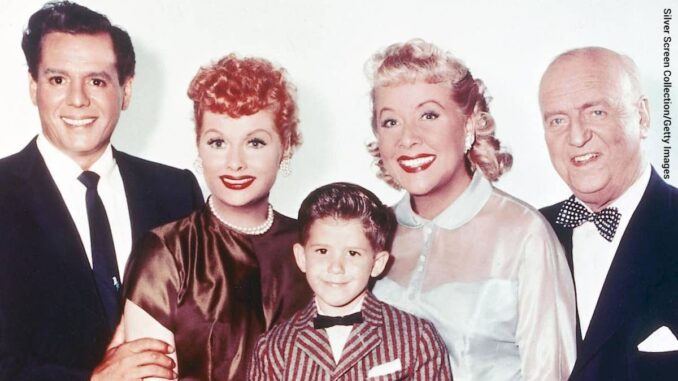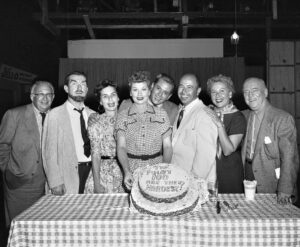
Introduction: A Historic Goodbye to Television’s Sweetheart
On May 6, 1957, television history was made as the final episode of the groundbreaking sitcom ‘I Love Lucy’ aired. For six seasons, Lucille Ball and Desi Arnaz captivated audiences with their comedic genius, redefining what television could be. But why did this beloved show come to an end, and what made its finale so significant? Let’s dive into the legacy of this iconic series and the day it bid farewell to its millions of fans.
The Phenomenon of ‘I Love Lucy’
What Made ‘I Love Lucy’ So Revolutionary?
‘I Love Lucy’ wasn’t just another sitcom—it was a cultural revolution. From its multi-camera format to its live studio audience, the show set the standard for modern television comedy. Lucille Ball’s impeccable timing and physical comedy, paired with Desi Arnaz’s innovative production techniques, made the show a must-watch for households across America.
The Chemistry Between Lucy and Ricky
At the heart of the show was the undeniable chemistry between Lucille Ball and Desi Arnaz, both on-screen and off. Their real-life marriage added an authentic layer to their portrayal of Lucy and Ricky Ricardo, a couple navigating life, love, and hilariously chaotic adventures.
Why Did ‘I Love Lucy’ End?
The Toll of Fame and Fortune
By 1957, the pressures of maintaining such a wildly successful show had taken their toll on Lucille Ball and Desi Arnaz. Balancing their personal lives with the demands of production became increasingly challenging.
Evolving Television Landscape
The television industry was rapidly evolving, with new shows emerging and audiences craving fresh content. While still immensely popular, ‘I Love Lucy’ had reached a natural conclusion.
Transition to ‘The Lucy-Desi Comedy Hour’
Although the sitcom ended, the Ricardos’ story didn’t stop there. Ball and Arnaz transitioned to a new format with ‘The Lucy-Desi Comedy Hour,’ which aired as occasional specials.
The Final Episode: A Bittersweet Goodbye
What Happened in the Last Episode?
The final episode, titled “The Ricardos Dedicate a Statue,” was a classic blend of humor and heart. It showcased Lucy’s antics as she tried to steal the spotlight during a statue dedication ceremony.

Fan Reactions to the Finale
Fans were heartbroken yet grateful for the laughter and joy the show had brought into their lives. The finale didn’t offer a dramatic conclusion but stayed true to the lighthearted spirit of the series.
The Legacy of ‘I Love Lucy’
Influence on Future Sitcoms
‘I Love Lucy’ paved the way for countless sitcoms that followed. Shows like ‘Friends’ and ‘The Big Bang Theory’ owe a debt to the trailblazing techniques pioneered by Ball and Arnaz.
Lucille Ball: The Queen of Comedy
Even after the show ended, Lucille Ball remained a force in entertainment. Her production company, Desilu Productions, was responsible for hits like ‘Star Trek’ and ‘Mission: Impossible.’
Syndication Success
‘I Love Lucy’ became one of the first shows to achieve massive success in syndication, ensuring its legacy would endure for generations.
Why May 6, 1957, Matters in TV History
The End of an Era
The final episode marked the end of a golden age in television. It was a day when audiences said goodbye to not just a show, but to a cultural phenomenon that had united families and brought joy to millions.
A Lasting Cultural Impact
Even today, ‘I Love Lucy’ remains a touchstone of American pop culture. Its humor, innovation, and heart continue to resonate with audiences worldwide.
Fun Facts About the Final Episode
- Lucille Ball and Desi Arnaz’s Real-Life Emotions: The couple’s impending divorce added an emotional weight to the finale.
- Audience Ratings: The show ended on a high note, maintaining its status as one of the most-watched programs on television.
- Preserved Legacy: The episode has been meticulously preserved and is still celebrated in retrospectives and documentaries.
How ‘I Love Lucy’ Changed Television Forever
Technical Innovations
From its pioneering use of the three-camera setup to its decision to film in front of a live audience, ‘I Love Lucy’ revolutionized television production.
Timeless Storytelling
The show’s humor and relatable storylines have stood the test of time, proving that great comedy is truly universal.
Why We Still Love Lucy
A Universal Appeal
Lucille Ball’s comedic genius transcends generations. Her ability to find humor in everyday situations ensures that ‘I Love Lucy’ remains as relevant today as it was in the 1950s.
A Reminder of Simpler Times
For many, the show is a nostalgic escape to a simpler, more innocent era—a time when laughter was the best medicine.
Conclusion: A Farewell That’s Forever
May 6, 1957, wasn’t just the end of a sitcom; it was the end of an era. ‘I Love Lucy’ left an indelible mark on television history, shaping the future of comedy and solidifying Lucille Ball and Desi Arnaz as legends. Decades later, we’re still laughing, still loving, and still cherishing the magic they created.
FAQs
- Why did ‘I Love Lucy’ end after six seasons?
The show ended due to the personal and professional pressures faced by Lucille Ball and Desi Arnaz, as well as their desire to explore new formats. - What made ‘I Love Lucy’ so iconic?
Its innovative production techniques, relatable humor, and Lucille Ball’s comedic genius made it a trailblazer in television history. - Did the Ricardos’ story continue after the final episode?
Yes, the characters appeared in ‘The Lucy-Desi Comedy Hour,’ which aired as occasional specials. - Is ‘I Love Lucy’ still popular today?
Absolutely! The show remains a beloved classic, thanks to its timeless humor and continued syndication. -
Where can I watch ‘I Love Lucy’?
You can find episodes on streaming platforms like Amazon Prime, Hulu, and Paramount+, as well as on DVD collections.